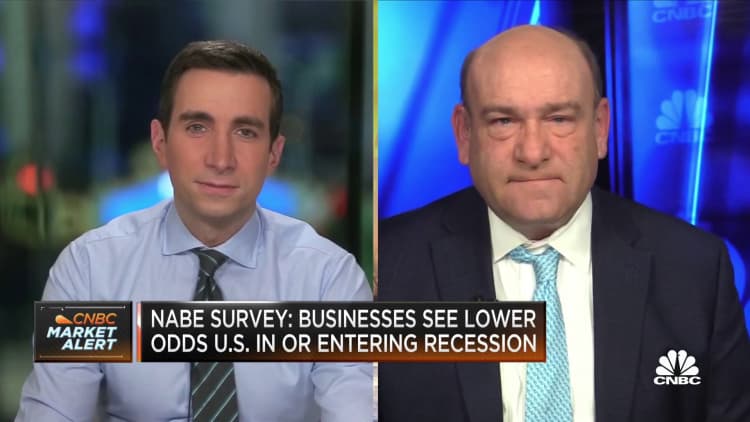As economists point to a ‘soft landing’ for the U.S. economy, here are financial risks for consumers to watch

[ad_1]
A Miami supermarket in July 2023.
Joe Raedle | Getty Images News | Getty Images
The forecast for the post-pandemic U.S. economy once called for a recession. Now many experts are backing off those predictions.
In the latest about-face, 69% of economists surveyed by the National Association for Business Economics said they see a “soft landing” on the horizon.
That’s a “significant shift” from March’s survey, according to NABE, when a similar share of respondents leaned toward a recession.
A soft landing is considered a slowdown in economic growth that avoids a recession.
More from Personal Finance:
Rather than a recession, we could be in a ‘richcession’
61% of Americans live paycheck to paycheck
Many young couples don’t split costs equally
A recession consists of at least two consecutive quarters of decline in gross domestic product, or GDP.
Still, some experts are holding tight to their recession predictions. NABE found 20% of those surveyed believe the U.S. economy is either currently in a recession or will enter one in 2023.
In recent weeks, some Wall Street firms have revised their previous recession calls. Bank of America is now says a soft landing is the most likely scenario. JP Morgan has said a soft landing is possible, though elevated recession risks remain.
Meanwhile, average Americans are not as optimistic, with 71% describing the U.S. economy as either “not so good” or “poor,” according to a recent Quinnipiac University poll. In comparison, just 28% of respondents said the economy is either “excellent” or “good.”

Here are three key areas of the economy experts are watching that will affect Americans’ money.
1. The job market is mostly strong
The U.S. would have already fallen into a recession if not for the strong job market, according to 77% of NABE survey respondents.
However, the latest jobs report showed less job growth than expected for July.
“The job market is less strong compared to the early part of this year, but still fairly robust given our economic cycle,” said Mervin Jebaraj, NABE economic policy survey chair.
While many workers were changing jobs more in the past 12 months, “the opportunities for that have cooled somewhat,” he said.
The unemployment rate is 3.5% — just above the lowest level since 1969.
2. Inflation will take time to subside
It may take more than 12 months for inflation to subside, according to 43% of NABE survey respondents. Just 7% said the pace of price growth will go down by this fall.
“People are generally in agreement the inflation rate has come down significantly and is likely to continue to go down, but maybe the speed at which it goes down is not what you would expect,” Jebaraj said.
The personal consumption expenditures price index, the Federal Reserve’s preferred inflation measure, rose 4.1% from a year ago as of June. Meanwhile, the consumer price index was up 3.2% over the past 12 months as of July.
People are generally in agreement the inflation rate has come down significantly and is likely to continue to go down.
Mervin Jebaraj
NABE economic policy survey chair
Both rates are higher than the Fed’s 2% target for inflation.
While the rate of inflation has come down, that does not necessarily provide relief to consumers.
“That doesn’t mean prices have come down; that just means that they’re going up slower,” said Ted Jenkin, a certified financial planner and the CEO and founder of oXYGen Financial, a financial advisory and wealth management firm based in Atlanta.
Unfortunately, once inflation does come down, prices will likely stay higher, noted Jenkin, who is also a member of the CNBC FA Council.
3. Interest rates may stay elevated
The Federal Reserve’s July rate hike took benchmark borrowing costs to the highest levels in more than 22 years.
Experts predict those rates will likely stay high — and could go higher — to curb inflation.
For consumers with outstanding debts, that may pose challenges as those balances become more expensive.
The Fed noted in a recent senior loan officer survey that a lot of banks and firms that extend credit are dialing back and reducing credit, noted Peter C. Earle, an economist at the American Institute for Economic Research.
“Any consumers whose consumption is predicated on the availability of credit, even to a small amount, are likely to see that change,” Earle said.
Those with outstanding balances should also be careful of their spending, especially with federal student loan repayment set to begin and the holiday season approaching in the coming months, Jenkin said.
“It’s hard to outrun a 24% interest rate on your credit card,” Jenkin said.
[ad_2]